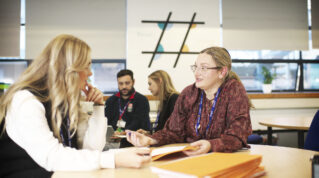We are in the midst of a climate-critical decade. The 10 New Insights in Climate Science as referenced at COP27 have suggested urgent global action to reverse the growth of global greenhouse gas emissions is needed if we are to reach anywhere near the Paris Agreement or Net Zero strategies.
By 2030 the Green Jobs Taskforce has set an ambition for two million green jobs in the UK. These green jobs will require green skill development in the talent pipeline. Recent recommendations by the Education and Training Foundation (ETF) have suggested that Awarding Organisations can promote Education for Sustainable Development by ensuring they have adequate specialist qualifications alongside embedded sustainability skills across all qualifications.
At Pearson, we are responding to that call to action by incorporating sustainability education throughout our reformed BTEC National qualifications. In addition, we have produced Embedding Sustainability, A Support Guide for BTEC Nationals, designed to provide guidance on embedding sustainable green life skills in a meaningful and pragmatic way. In doing this we hope to support the mission of colleges and schools to achieve their own sustainability targets in line with the DfE Sustainability and climate change strategy.
Supporting the delivery of sustainability education
One of the major challenges is how we address sustainability. FE Week recently reported sustainability as the fourth functional skill. Sustainability should not be an optional add-on but neither should it be something that is synthetically forced into an unfitting curriculum.
The Pearson School Report indicated that 43% of teachers would like climate change and sustainability thread throughout the curriculum. It also indicated that 61% of teachers feel that the current education system does not successfully develop tolerant, sustainably minded global citizens.
According to the Leadership for Education for Sustainable Development in the FE Curriculum report by the Education and Training Foundation, whilst 3% of all FE learners are enrolled on qualifications with some sustainability or green skills, only 0.5% are enrolled on qualifications with significant sustainability content, and in the vast majority of cases those individuals were studying Geography or Environmental Science type qualifications.
There is a real enthusiasm amongst teachers, lecturers, schools and colleges to deliver key green skills across the curriculum regardless of subject. We have recognized that there are a multitude of opportunities to incorporate the discussion of sustainability topics throughout the BTEC Nationals, which we’ve outlined in Embedding Sustainability: A Support Guide for BTEC Nationals.
Sustainability is best understood when it is applied in realistic contextual situations, it is only then that learners feel able to articulate ideas of sustainability, to positively impact challenges in sustainability. We hope that this sustainability guide will offer an opportunity to implement sustainable themes into your teaching practice without any significant impact on preparation and delivery time.
Why deliver sustainability skills?
We are in a world with 1.8 billion young people between the ages of 10 to 24, according to UN Youth In Action, the largest generation of youth in history. Young people are increasingly aware of the challenges and risks associated with the climate crisis. Students Organising for Sustainability in UK demonstrate that young people are keen to take action to work towards a sustainable future. Sustainability needs to be at the forefront of learning, so that a future focused curriculum provides young people with the skills they need to address the climate emergency.
The International Energy Agency (IEA) has suggested that there will be a wealth of new employment opportunities in sustainability, amounting to 14 million jobs by 2030. Our sustainability guide will assist in embedding sustainability skills across the curriculum to create a workforce that is appropriately skilled to undertake these sustainable roles.
“The Further Education (FE) and Training sector has a critical role to play in combating climate change and achieving sustainability and social justice both nationally and globally. There isn’t a subject nor industry that won’t be touched by sustainability so it’s vital all learners become sustainability learners. Awarding Organisations can influence significant change in what knowledge, skills and behaviours learners are developing through their course, so it’s great to see Pearson working to embed sustainability education across its portfolio as well as developing specialist sustainability qualifications.” Charlotte Bonner
National Head of Education for Sustainable Development, Education and Training Foundation

















Your thoughts